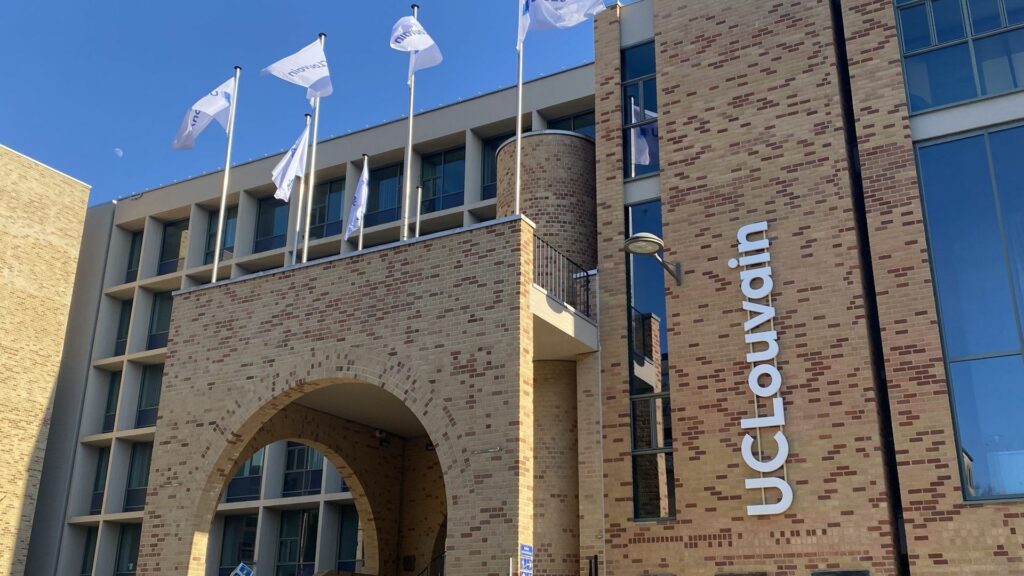In 1425, Pope Martin V founded the Studium generale Lovaniense aiming to be a centre of education. Next year, in 2025, not one but two heirs will be celebrating the 600th anniversary of this foundation.
This anniversary is an excellent opportunity to reflect on the continuities and discontinuities present in the history of this institution.
The Catholic element in the name of the university, which is still maintained today, first appeared in 1834 with the establishment of the Universitas catholica Belgii, as named by Pope Gregory XVI.
In 1835, it became known as the Catholic University of Mechlin/Mechelen. The change in the name sparked protests from liberals, who viewed it as an attempt to usurp the legacy of the Old University of Leuven. Such discomfort led them to found a brand new university: the Free University of Brussels.
Recently, Philippe Van Parijs has revisited the debate around getting rid of the adjective “catholic” from the name of the University, although his immediate aim was a compromise to establish the official name as “UCLouvain”. The main reasons for this appeal were that it would be more attractive to people without Catholic backgrounds and that it would not evoke a “sectarian image” abroad.
Let me start by noting that a similar kind of argument can be made in many other cases. Would it be reasonable to change the name of the city of San Salvador or San Juan, the capitals of El Salvador and Puerto Rico, because for some people it could prove difficult to dispel the image of a Christian country when making deals with them? Or could we justify changing the name of the Royale Union Saint Gilloise or of the Royal Academy of Belgium because they might appeal to people with anti-royal backgrounds?
The first point sustains that “ULouvain” would be more welcoming for students without a Catholic background, allowing them to feel fully at home; in particular, for Muslim students, who belong to the second-largest Belgian religious community. In fact, Van Parijs sustains that religious affiliation has “nearly completely” “vanished as a determinant of students’ university choice”.
But then, it seems that the “C” is not so relevant for the feeling of belonging after all — or, at least, that the feeling of belonging is not so important when making the choice of a university. But even assuming the contrary, this supposedly negative effect of the “C” should be weighed against its positive effects in attracting certain people (in particular, people with Catholic and Christian backgrounds from South America and Africa, which are globally growing populations as Muslims are) and, more importantly, in reclaiming continuity with a long and prestigious tradition.
Religious issues
Keeping the “C” does not prevent the University from helping members of other religious groups feel at home and, moreover, it is a reason to put in more effort to this effect. If the University acknowledges its religious background, this is a reason for giving importance to religious issues. This is something that certain forms of educational secularism often miss and that sometimes triggers prejudices fed by ignorance against religious manifestations (as might be interpreted in the case of the "prayer room" at ULB).
The Catholic label in the name should be an invitation to devote rigorous academic work to the study of God and religious manifestations from as many points of view as possible — such as cultural, sociological, economical, historical and artistic perspectives. Therefore, the Catholic label, far from excluding or simply ignoring other religious views, is an invitation to think rigorously about them. Muslims should find that their beliefs are not only tolerated but seriously considered and studied in their university.
Another argument is based on the fact that “the label ‘Catholic’ still evokes in many countries, not least the United States, an image that does not correspond to the reality of our institution. However, it should be noted that the name would not reflect the “reality of the institution” even if “Louvain” is maintained, or if the University is renamed “Louvain-la-Neuve University”, because the University is no longer located in Louvain and has expanded beyond Louvain-la-Neuve.
More generally, the point is that we should not exaggerate the descriptive function of proper names: the “Université catholique du Louvain” refers to the same institution as it did before 1979, when it was definitely moved to Louvain-la-Neuve.
Still, the failure to reach an agreement between Harvard, KULeuven, and UCLouvain is cited as a result of the label “Catholic”. Despite being named after Christian saints, there is typically no contention regarding the sectarian nature of universities like San Marcos in Peru or St. Andrews in Scotland (the latter could change its name to avoid a “sectarian image”, even if it meant no longer sharing the name of the town).
Furthermore, there is generally no intention to change the names of universities named after slavery apologists and racists, such as UC Berkeley or Rutger University, or those that could be thought to honour them, like Stanford University — with which Harvard University would probably not avoid agreements because of their names.
In our less serious case, rather than removing a part of the University’s identity, it seems more appropriate to educate those with prejudices about the nature of the institution.
Reclaiming continuity with a long and prestigious tradition partially depends on keeping the “C”. Otherwise, the KULeuven would be seen as the only heir of the Catholic University lineage in contrast with the heirs of the anti-clerical lineage of the Free Universities (ULB and VUB).
Additionally, the “C” also includes the new partners of the University, so the Catholic aspect can naturally be seen as a unifying factor among them — i.e., Facultés universitaires Notre-Dame de la Paix (FUNDP), Facultés universitaires Saint-Louis (FUSL), and Facultés Universitaires Catholiques de Mons (FUCAM).
Question of identity
The “C” is a mark of the University’s unique identity. In socialist philosopher Gerald Cohen’s defence of small-c conservatism, he claims this perspective “aligns with a particular conservative attitude — an inclination to preserve what holds value, not solely based on its intrinsic worth, but also for its unique identity and the personal connections it fosters.”
The essence of small-c conservatism lies in recognizing that not everything should be subject to utilitarian transformation. We should not always yield to the (uncertain) promise of increasing value, such as attracting more students; sometimes we should honour the legacy of our institutions and keep valuable things as they are.
The commemoration of the 600 years of the University celebrates an institution whose legacy is inseparable from its Catholic roots. This is the University in which “in 1465 a member of the Arts faculty, Peter de Rivo, was asked by his students to discuss the question: was it in St Peter’s power not to deny Christ after Christ had said ‘Thou wilt deny me thrice’?” He answered that the proposition is neutral, neither true, because determinism follows, nor false, because Christ’s claim would be false. It is in this reflection where we can find the formulation of the three-valued logic, which was not rediscovered until the 20th century.
The University of Louvain’s legacy is intertwined with its Catholic identity, and to discard that heritage is to lose a part of its soul. The fruitfulness of this relationship spans from 1465 non-bivalent logic to the proposition of the Big Bang theory by Catholic priest Georges Lemaître, and includes Vives’ revolutionary idea of government-granted poverty insurance, which paved the way to our modern social security system.
May the Catholic University commemorate 600 years with the Pope, and may it thrive for another 600 years.


